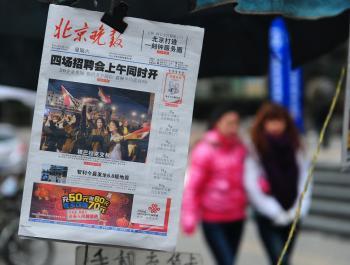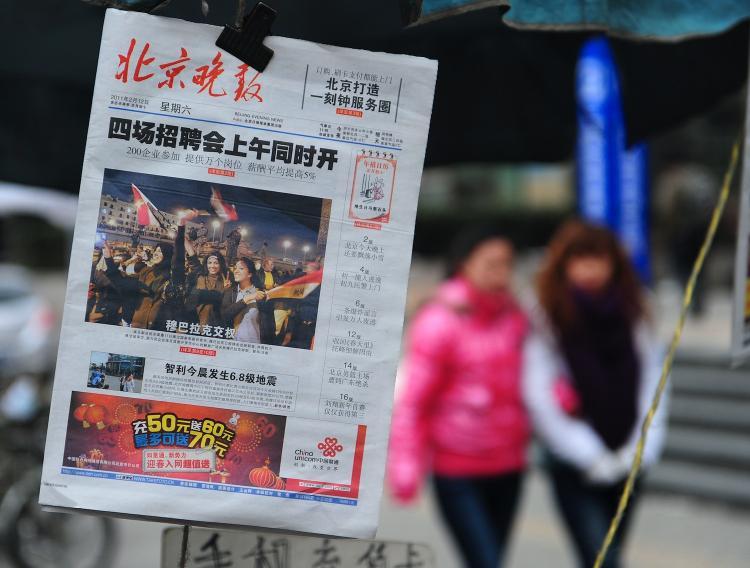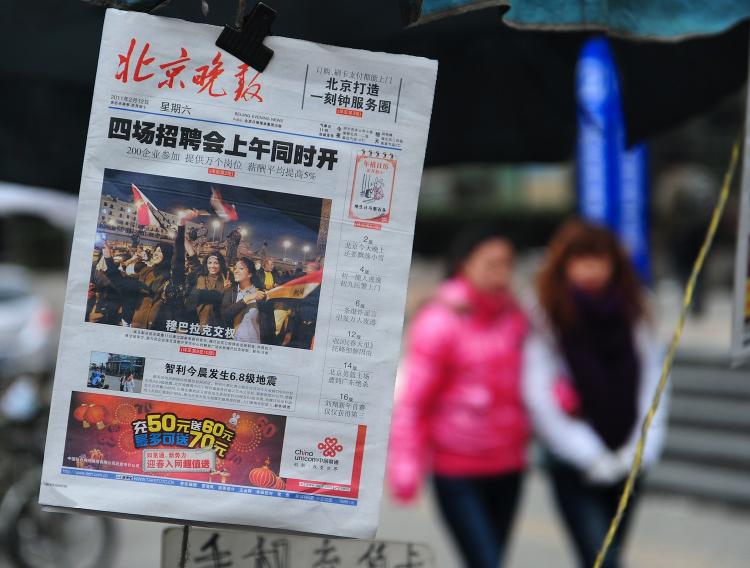WASHINGTON—Recent tumult in the Middle East and North Africa teach that the legitimacy of a political regime is crucial to that regime’s stability—this is an important lesson for understanding China, according to discussants at a recent panel.
Thinkers, writers, observers and activists on China gathered in the Cannon House Building on March 2 to exchange insights. The forum was partly organized by The Epoch Times and hosted by the newspaper’s Washington General Manager, Tsuwei Huang.
John Tkacik, former Foreign Service Officer, gave an extemporaneous performance peppered with Chinese phrases collecting his 35 years of thinking and observing China in light of recent events.
His analysis was essentially of legitimacy and propaganda, and the role of the latter in supporting the former.
Autocrats do not rely on the consent of the governed, but on an ideology carried by agitprop, Tkacik said. In Nazi Germany it was nationalism and its corollary, “grotesque racism”; in the Soviet Union it was the “universal truth of Marxism-Leninism”; and in China the Chinese Communist Party (CCP) based its legitimacy on a congeries of theoretical developments from Mao to Deng to Jiang to Hu.
The bottom line was that, “If you’re against the Communist Party you’re against China, and if you’re against China we can shoot you.”
People like Wei Jingsheng and his cohort fundamentally challenged this idea throughout the 1980s. The idea that China did not need the Communist Party was the soil from which the anti-corruption (and pro-democratic reform) protests grew in 1989.
After the Tiananmen Massacre, Deng Xiaoping knew the CCP’s ruling ideology needed a refurbishment. Deng was a lot of things, Tkacik says, but he wasn’t stupid. He knew how to decoct a narrative of legitimacy.
From his Southern Tour (1992) onward he set about forging the latest New China. It was still not about the consent of the governed, but instead “Socialism with Chinese characteristics.” Tkacik says this is nothing other than, “Whatever increases the comprehensive strength of the nation.” And the Communist Party says that it is the only force able to build China’s comprehensive strength.
This theoretical sleight of hand then gives the Party the notional authority to extend its control to all aspects of life of the Chinese people: family, education, religion, whether one may protest against pollution or not, protest against poisoned food or not, Tkacik says.
But eventually people will resist injustice. “One of these days,” Tkacik says, “something the CCP does is going to tick off a lot of people in a large geographic area, and there will be an uprising.”
Wei Jingsheng, sometimes called the godfather of the democracy movement, said in his speech that he finds the democracy movements in the Middle East and North Africa interesting because of their lack of leadership: the courage of the youth and clever use of technology was enough.
Chinese can learn they don’t need outside support or leaders to impel change, Wei says.
Wei suggests that activists focus their energies on influencing the opinions of the Chinese masses, rather than trying to convince US lawmakers, China scholars, and journalists of the Party’s impending demise.
The idea of reaching out directly to the people fitted in with the next speaker, Charles Lee, public relations director of the Global Service Center for Quitting the CCP, a group that solicits renunciations from the Chinese Communist Party.
His volunteer organization makes thousands of phone calls into China every day and each day receives tens of thousands of renunciation notices on its website. Some renunciations are brief, some spill out a life of bitterness with the regime. Renunciations may be from Party members or non-Party members.
Lee’s organization so far has received the renunciations of over 90 million people, and the number is growing every day. “The future is bright, and things move very fast.”
He believes that this simple mechanism for expressing mass discontent will assume an important place in defining China’s future.
“When the CCP collapses,” Lee says, “people will finally relax and China will be free.”
Tsuwei Huang says it will happen eventually, and that the U.S. should get ready.
Thinkers, writers, observers and activists on China gathered in the Cannon House Building on March 2 to exchange insights. The forum was partly organized by The Epoch Times and hosted by the newspaper’s Washington General Manager, Tsuwei Huang.
John Tkacik, former Foreign Service Officer, gave an extemporaneous performance peppered with Chinese phrases collecting his 35 years of thinking and observing China in light of recent events.
His analysis was essentially of legitimacy and propaganda, and the role of the latter in supporting the former.
Autocrats do not rely on the consent of the governed, but on an ideology carried by agitprop, Tkacik said. In Nazi Germany it was nationalism and its corollary, “grotesque racism”; in the Soviet Union it was the “universal truth of Marxism-Leninism”; and in China the Chinese Communist Party (CCP) based its legitimacy on a congeries of theoretical developments from Mao to Deng to Jiang to Hu.
The bottom line was that, “If you’re against the Communist Party you’re against China, and if you’re against China we can shoot you.”
People like Wei Jingsheng and his cohort fundamentally challenged this idea throughout the 1980s. The idea that China did not need the Communist Party was the soil from which the anti-corruption (and pro-democratic reform) protests grew in 1989.
After the Tiananmen Massacre, Deng Xiaoping knew the CCP’s ruling ideology needed a refurbishment. Deng was a lot of things, Tkacik says, but he wasn’t stupid. He knew how to decoct a narrative of legitimacy.
From his Southern Tour (1992) onward he set about forging the latest New China. It was still not about the consent of the governed, but instead “Socialism with Chinese characteristics.” Tkacik says this is nothing other than, “Whatever increases the comprehensive strength of the nation.” And the Communist Party says that it is the only force able to build China’s comprehensive strength.
This theoretical sleight of hand then gives the Party the notional authority to extend its control to all aspects of life of the Chinese people: family, education, religion, whether one may protest against pollution or not, protest against poisoned food or not, Tkacik says.
But eventually people will resist injustice. “One of these days,” Tkacik says, “something the CCP does is going to tick off a lot of people in a large geographic area, and there will be an uprising.”
Wei Jingsheng, sometimes called the godfather of the democracy movement, said in his speech that he finds the democracy movements in the Middle East and North Africa interesting because of their lack of leadership: the courage of the youth and clever use of technology was enough.
Chinese can learn they don’t need outside support or leaders to impel change, Wei says.
Wei suggests that activists focus their energies on influencing the opinions of the Chinese masses, rather than trying to convince US lawmakers, China scholars, and journalists of the Party’s impending demise.
The idea of reaching out directly to the people fitted in with the next speaker, Charles Lee, public relations director of the Global Service Center for Quitting the CCP, a group that solicits renunciations from the Chinese Communist Party.
His volunteer organization makes thousands of phone calls into China every day and each day receives tens of thousands of renunciation notices on its website. Some renunciations are brief, some spill out a life of bitterness with the regime. Renunciations may be from Party members or non-Party members.
Lee’s organization so far has received the renunciations of over 90 million people, and the number is growing every day. “The future is bright, and things move very fast.”
He believes that this simple mechanism for expressing mass discontent will assume an important place in defining China’s future.
“When the CCP collapses,” Lee says, “people will finally relax and China will be free.”
Tsuwei Huang says it will happen eventually, and that the U.S. should get ready.







